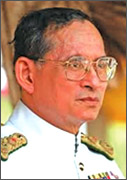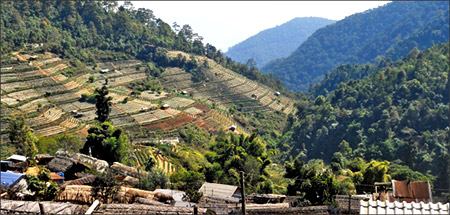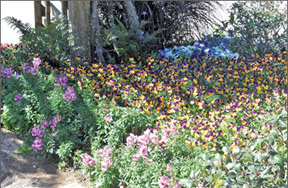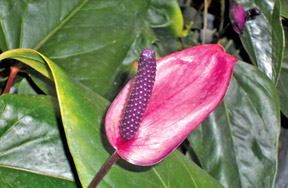
Thai king’s lesson to the world
Disna Mudalige
 |
|
Thailand’s
King Bhumibol Adulyadej |
 |
|
The
cultivation of layered paddy fields |
“Our actions must be like drops of water, ripples from each drop
expanding ever outward to touch countless others.”
Thai King Bhumibol Adulyadej’s reign shows abundant evidence of
having exercised this philosophy in practice. Any tourist in Thailand
will certainly be impressed by his projects undertaken to the country’s
betterment.
King Bhumibol, who celebrated his 84th birthday in December, 2011,
was enthroned when he was only 18. As the longest serving monarch in the
world since 1989, he has initiated more than 4,000 development projects
throughout the country. Interestingly most projects have benefited the
needy communities in rural areas. The projects, known as ‘Royal
Development Projects’, are a result of king’s extensive traveling across
the country. He has been informed about the common man’s grievances. The
majority of Thai kingdom appreciates these well documented projects.
However the projects are little, or not, known outside Thailand. The
projects are a fine lesson to Sri Lanka too in its quest to home-grown
and indigenous solutions.
Drug crop replacement
King initiated a project in 1969 to solve the issue of deforestation,
poverty and opium production by promoting alternative crops. It is
fascinating to see how the project has completely eliminated the growth
of opium poppy in the northern highland areas of the country by
introducing newly improved crops. That has enabled hill-tribe people to
attain better living conditions while sustaining the land’s rich
biodiversity.
|
Royal Project Foundation
Growing numbers of hilltribe people were accelerating their
slash-and-bum practices in the highlands in order to clear land for the
cultivation of rice, corn and opium poppy, the rice and corn for their
own food, the opium poppy to be sold or exchanged for other needed
commodities.
In 1959 the State had promulgated legislation banning the cultivation
of the opium poppy, but there did not exist at the time any research and
development programs to help provide the hilltribe people with
alternatives. For several years they had no choice but to covertly, with
this their only cash crop. Not only were their activities illegal but
they also posed a threat to border security and to the nation's vitally
important watershed areas. In response to the problem. King Bhumibol
conceived and launched the Royal Project in 1969.
Objectives
1. Offer a helping hand to all humankind;
2. Ensure natural resources for conserving a sustainable future;
3. Eradicate opium poppy cultivation and opium derived addiction
problems;
4. Encourage a wise and proper balance in utilising and conserving
land and forest resources.
Development
An intensive effort has been and is being made to develop the
necessary infrastructure, e.g. village roads, small irrigation systems
and village electricity. Teams are working on improvement of watershed
areas through proper land use management and soil conservation practices
in the already slashed and burned areas. |
 |
|
Flower
garden in Doi Ang Khang |
 |
|
Flower researcher Supsak Senawong
explains his research on flowering plants |
The Royal Project has three main activities: research, development
and marketing. Presently there are 36 Royal Project Development Centres
and four Research Stations in five provinces of Northern Thailand
including Chiang Mai and Chiang Rai.
Instead of the tormentor opium, the project has introduced fruit
trees, vegetables, flowers, herbs and beverages such as tea and coffee
to hill tribes. These project sites are available for domestic and
foreign tourists. Tourism has become an additional income source to
these villages.
Ang Khang Royal Agricultural Station
Ang Khang is a village, surrounded by spectacular natural scenery,
situated in Chiang Mai province. Mount Ang Khang is the sixth tallest
mountain in Thailand. The station was set up in this mountain as the
Royal Project's plant research station, based on the concept of
self-reliance.
A visitor would see it is a fertile area now with a wider range of
fruits, cold climate vegetables and flowers.
New agro-technologies and methods are also tested and introduced in
this station. One such technology is growing lettuce on regiform using
water underneath. Thereby the use of soil is not required anymore.
Thailand has introduced this technology to Maldives, where it is
highly useful with the limited availability of land. The villagers run
restaurants with the fresh vegetables, which have replaced opium. Well
maintained vegetables and flower gardens are an unmistakable sight.
Inthanon Royal Agricultural Station
Mount Inthanon is another area under the purview of Royal Project.
The project has allowed human communities and forests to co-exist
harmoniously. Reforestation activities have been undertaken while
introducing sustainable cultivation methods instead of the destructive
‘slash-and-burn’ farming which had been quite popular among villagers.
Visitors to this area can observe the cultivation of layered paddy
fields, highland farming systems, coffee plantations and strawberry
plots.
According to Inthanon Station’s flower researcher Supsak Senawong,
they import flower varieties from numerous countries and research to
improve their quality to suit the Thai climate. This has created a
competition for flowers in the market. The research is carried out until
the best result is achieved, and it covers all aspects of flowering
plants from pest control to colours of flowers.
Home-grown solutions
 |
 |
|
Two-coloured
and purple coloured anthuriums developed at the station. |
In addition to the Royal Project, recognized as a successful and
impressive project, the royal family has engaged in a number of other
projects too for the Thai welfare. Some are with royal family funds,
implemented and experimented by the King. Later the Thai government has
taken up the projects for further development.
Private sector has also embarked on more projects with the king’s
advice and guidelines. At times the king would initiate a project and
advice the government agencies for implementation and studies.
What’s special about these development projects is that they are
designed, implemented and developed to suit the local conditions and
requirements. The king has a habit of carrying three items wherever he
travels: pencil, map and dual radio, showing the world how he works out
his own indigenous strategies.
The Royal Development Projects depict the value of home-grown
solutions to problems. Touring the Royal Project Sites in Thailand gives
the impression that people-participatory development is the best thing
we can opt for.
|



